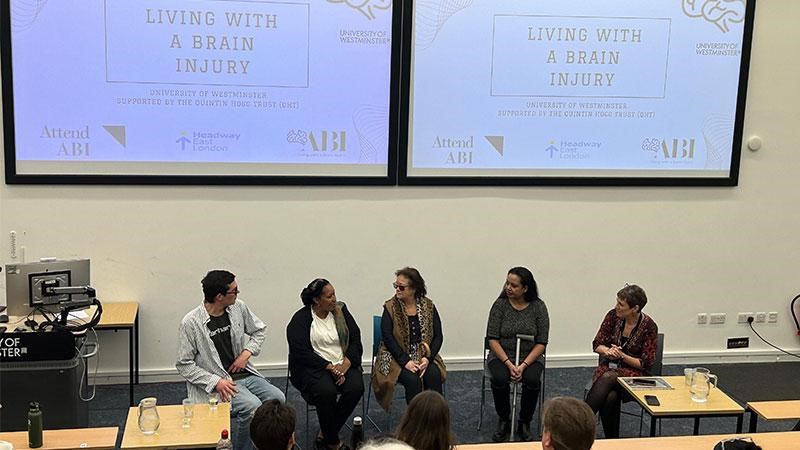News
ALL NEWSBrain injury survivors share their stories with students at public University of Westminster event.
In a public event to mark Brain Awareness Week, the University of Westminster invited a panel of brain injury survivors to share their experiences on how their brain injury has changed their lives. A Quintin Hogg Trust funded project.

Dr Laura Boubert holding panel discussion with five Acquired Brain Injury survivors
Supported by the Quintin Hogg Trust, the Schools of Social Sciences, Life Sciences and Arts, along with the Brain Matter(s) Student Society joined forces with charities ATTEND and Headway East London to bring together the event titled What It’s Like to Live with a Brain Injury: In Conversation with Brain Injury Survivors.
The conversation explored the survivors’ life stories and how their brain injury has changed their lives and their cognition.
The event opened with a presentation by four of seven student interns studying across Psychology, Computer Science and Media, who are taking part in the Living with a Brain Injury project. They provided an overview of the, where Acquired Brain Injury (ABI) survivors, charities, academics and students are working together to bring the lived experience into the classroom and co-create new publicly available teaching resources for authentic assessments.
The event also marked the official launch of the co-created podcast series Living with a Brain Injury, where listeners can hear in-depth one-on-one conversations with brain injury survivors. This will be launched on Spotify in April.
Dr Laura Boubert said: “ABI affects around 1.3 million people in the UK, people of all ages and all walks of life – it can happen to anyone, anytime and change your life forever, yet most people know very little about it. As it’s an invisible condition, it’s crucial that we all know more about it to reduce misunderstanding of the condition to help survivors have a better quality of life.”
This event directly contributes to the United Nations Sustainable Development Goals (SDG) 3: Good Health and Wellbeing, 4: Quality Education and 10: Reduced Inequalities. Since 2019, the University of Westminster has used the SDGs holistically to frame strategic decisions to help students and colleagues fulfil their potential and contribute to a more sustainable, equitable and healthier society. Through a greater awareness people can understand the reality of living with a brain injury, which will help create a more understanding and supportive world.
This was the closing event for Westminster’s Brain Awareness Week calendar.
Please follow this link to see full story
Bill Weston stands down as Chairman of the Quintin Hogg Trust